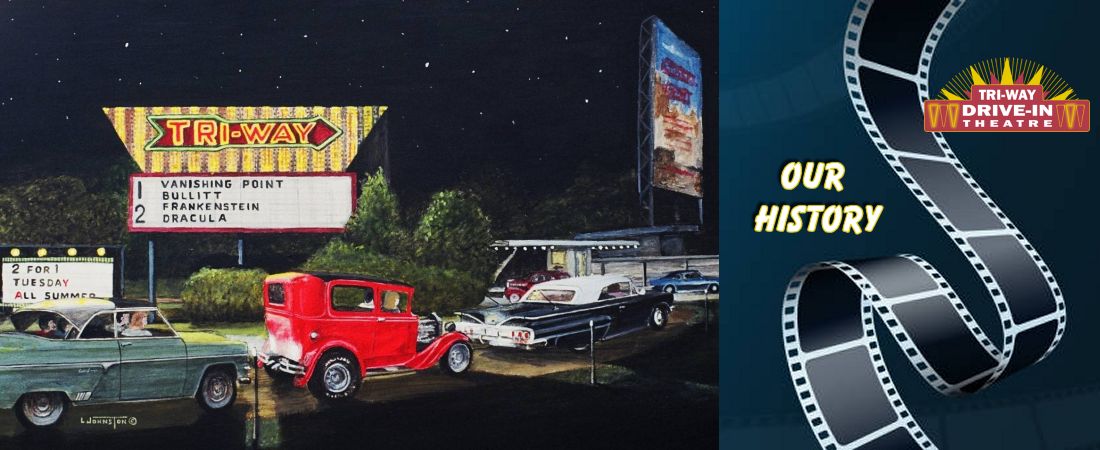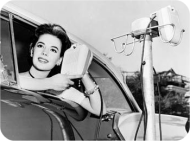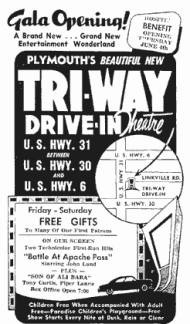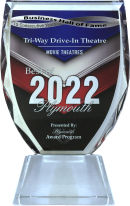
4400 Michigan Rd,
Plymouth, IN 46563
Website here
 The Tri-Way Drive-In Theater opened their doors on June 4, 1953 as a single screen venue in the early years of America's Drive-In boom, with the showing of "Has Anyone Seen My Gal," starring Charles Coburn and Piper Laurie. This was a benefit performance with the proceeds going to the Hospital Auxiliary.
The Tri-Way Drive-In Theater opened their doors on June 4, 1953 as a single screen venue in the early years of America's Drive-In boom, with the showing of "Has Anyone Seen My Gal," starring Charles Coburn and Piper Laurie. This was a benefit performance with the proceeds going to the Hospital Auxiliary.
The name of the theater was selected from names submitted by the public. The name was selected because of its location on what was U.S. 31, between U.S. 6 and 30. Janet Combs, who submitted the name, received a year's family pass to the theater.
"Tri-Way" is one of the few operating drive-in theaters in the state of Indiana. It currently has four screens for your viewing pleasure.
A Short History of the Drive-In Theatre....
A young sales manager by the name of Richard Hollingshead who worked at his father's Auto Products Store, had an idea to invent something that combined his two interests: cars and movies.
 The first patent for the Drive-In Theater (United States Patent# 1,909,537) was issued on May 16, 1933. With an investment of $30,000, Richard opened the first drive-in on Tuesday June 6, 1933 at a location on Crescent Boulevard, Camden, New Jersey. The price of admission was 25 cents for the car and 25 cents per person.
The first patent for the Drive-In Theater (United States Patent# 1,909,537) was issued on May 16, 1933. With an investment of $30,000, Richard opened the first drive-in on Tuesday June 6, 1933 at a location on Crescent Boulevard, Camden, New Jersey. The price of admission was 25 cents for the car and 25 cents per person.
The inventor subjected his new drive-in to vigorous testing: for sound quality, for different weather conditions (Richard used a lawn sprinkler to imitate rain) and for figuring out how to park the patrons' cars. Richard tried lining up the cars in his driveway, which created a problem with line of sight if one car was directly parked behind another car. By spacing cars at various distances and placing blocks and ramps under the front wheels of cars that were further away from the screen, Richard Hollingshead created the perfect parking elevation for the drive-in movie theater experience.
The design did not include the in-car speaker system we know today. The inventor contacted a company by the name of RCA Victor to provide the sound system, called "Directional Sound." Three main speakers were mounted next to the screen that provided sound. The sound quality was not good for cars in the rear of the theater or for the surrounding neighbors.
The largest drive-in theater in patron capacity was the All-Weather Drive-In of Copiague, New York. All-Weather had parking space for 2,500 cars, an indoor 1,200 seat viewing area, kid's playground, a full service restaurant and a shuttle train that took customers from their cars and around the 28-acre theater lot.
The two smallest drive-ins were the Harmony Drive-In of Harmony Pennsylvania and the Highway Drive-In of Bamberg, South Carolina. Both drive-ins could hold no more than 50 cars.
An interesting innovation was the combination drive-in and fly-in theater. On June 3, 1948, Edward Brown, Junior opened the first theater for cars and small planes. Ed Brown's Drive-In and Fly-In of Asbury Park, New Jersey had the capacity for 500 cars and 25 airplanes. An airfield was placed next to the drive-in and planes would taxi to the last row of the theater. When the movies were over, Brown provided a tow for the planes to be brought back to the airfield.


